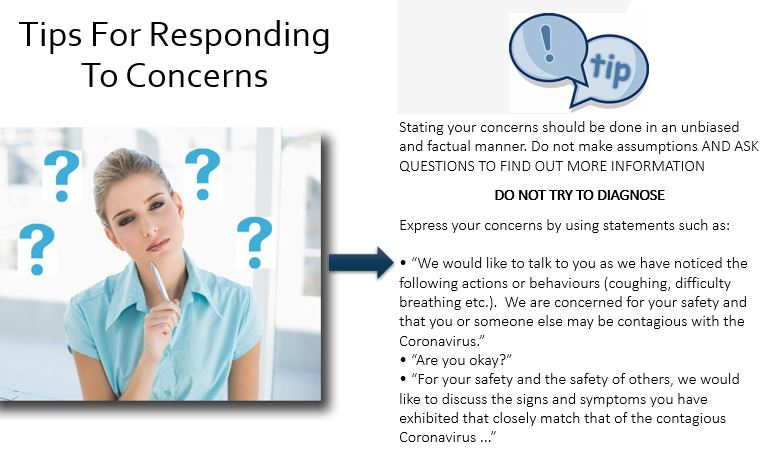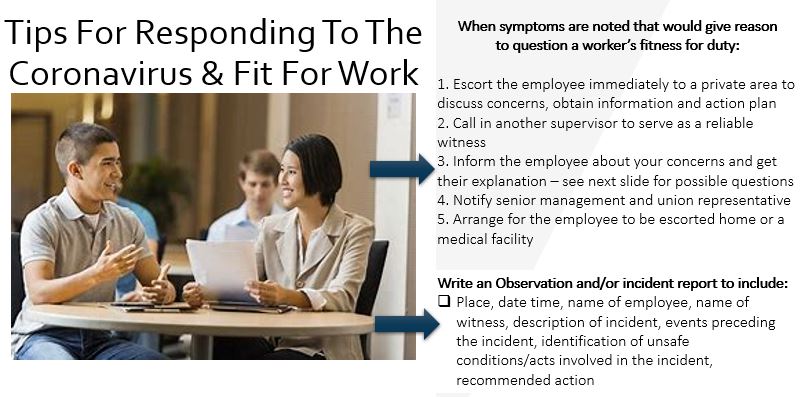The information in this blog is compiled using the guidelines under PIPEDA (Personal Information Protection and Electronic Documents Act) regarding Pandemic Disclosure
Download A Free Poster On Screening For Covid-19
Can Companies Require Employees To Disclose Symptoms And Positive Diagnosis of COVID-19 ?
An employer can require employees to report any flu-like symptoms, including a fever, cough, and/or shortness of breath, or other symptoms that may be indicative of COVID-19.
Be mindful that, to comply with privacy laws, an employer should only collect/request personal information from employees that is reasonable given the circumstances. Given the COVID-19 pandemic and the need to ensure workplace safety, a requirement for employees to disclose symptoms that are indicative of COVID-19 would be “reasonable”, however a requirement or request to disclose further personal information unrelated to the employer’s legitimate interest in maintaining workplace safety would likely be unreasonable.
Employers should also take reasonable measures, to the extent possible, to protect the identity of any employee who contracts COVID-19
- Companies should not inform its workforce of the identity of the person with the confirmed diagnosis
- Companies should not provide other identifying information about the person

If an employee has COVID-19, does the employer have to report it to the provincial or federal government?
There is no obligation to report a confirmed case of COVID-19 to federal or provincial health authorities. The medical professional who received the diagnosis has the obligation to report the positive test result to provincial health authorities.
However, if an employee in the workplace is diagnosed, employers may want to voluntarily contact public health authorities to receive advice and assistance in identifying close contacts the infected employee had in the workplace. What constitutes “closely” will depend on the workplace and the nature of interactions between employees. Employers should err on the side of caution.
All employees who worked closely with the infected employee should also be removed from the workplace for at least a 14-day period to ensure the infection does not spread in the workplace.
Consult local health authorities for further information for steps for implementing safe working practices.
Best Practices:
Here are a few of our best practice recommendations, based on the advice of Canadian provincial and federal public health authorities:
Track and monitor your workforce
Due to the latency period of COVID-19, it is important to track where employees have worked in your facility, and who they work closely with. An example could be to have sign-in sheets in each department or section.
If an employee tests positive for COVID-19
The local public health unit will ask employers to provide information on where the employee worked, as well as assist in identifying possible close contacts and will request information of any other employee who may have been exposed. Public Health will contact the employees directly and provide strategies for reducing exposure and spread.

What About Temporary Workers?
Any new staff (including new temporary workers) brought in during this COVID-19 outbreak should be screened for symptoms before being deployed and upon arrival at the jobsite.
ABL Employment has implemented a pre-dispatch screening questionaire to evaluate the “Fit For Work” status of all temporary employees dispatched to a new assignment. In addition, all actively deployed ABL temporary workers are required to report any and all changes in their Fit For Work status, including whether they begin to exhibit any possible symptoms of COVID-19.
As part of our COVID-19 Response Plan, ABL has instituted a “Essential Services Rapid Response Team”: temporary associates who are available and fit for work are encouraged to stay in regular contact with our branch teams so they can be enrolled in our Rapid Response Team, and be the first to be called when an Essential Business contacts ABL to assist them while they practice prudent and proactive absenteeism and self-isolation in their own workforce when needed.
Why Use Temporary Workers During This Outbreak?
As the number of staff who are sick or self isolating increases, it is important not to overwork and/or over burden current healthy employees as this can quickly lead to physical and mental fatigue.
Best practice would be to replace sick employees on a temporary basis in order to continue operating. Temporary assignment employees can fill positions in office administration including payroll, customer service, data entry, general labour, stocking shelves, order picking, operating equipment, delivery driving, and more.
During this pandemic, an employer can bring in employees on a temporary basis who have the skillset that the company needs to continue being productive. An employer may also ask healthy full-time employees and/or temporary employees to work additional hours, in accordance with legislative provisions regarding overtime and excessive hours of work.









